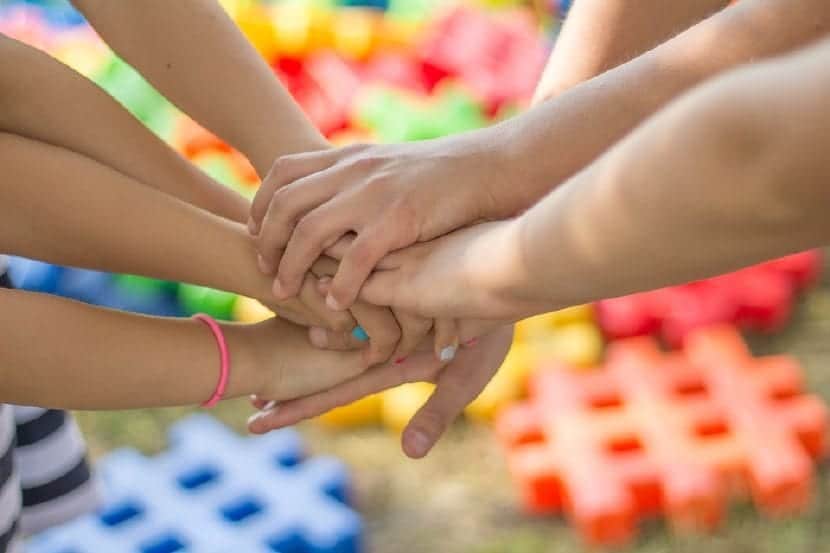
The Values are necessary to guide your behavior and determine your way of being. They are principles that allow us to become a better person. They allow differences between good and evil. Thanks to them we will educate empathetic, coherent and respectful people. They are essential to relate properly.
Asking for forgiveness is not mere courtesy, it is one of the main values that we can transmit to our children. And these values are not learned at school, but at home. And it is essential to guide you in your healthy adult stage.
What does it mean to ask for forgiveness?
Many children do not know how to ask for forgiveness, because it relates to accepting a mistake, and they do not like that. It causes them discomfort and shame. They must be taught that asking for forgiveness can be a way to try to repair the damage done and learn from it.
Asking for forgiveness in a humble way means that we are human and we are wrong, although we want to improve and for this we accept our mistakes. We are recognizing that we value the feelings of others, ahead of our excessive pride. We put it aside, because it prevents us from growing and improving. It takes us away from others. It gives us a shield of protection that only serves to keep our self-worth safe.
Why is it necessary to teach children to ask for forgiveness?
For teach them a correct sense of responsibility, we must teach our children to ask for forgiveness and what it is for. Sometimes they can use it in an insincere way to escape punishment, and at other times not being able to say it.
There are a few fundamental principles that should be taught at home through education. We give too much importance to grades, but little to emotional education. It is our job to instill in our children values that are so neglected today.
At first you will have to guide him when he does something wrong. Especially with the little ones (under 5 years old) who find it difficult to identify that they have done something wrong and do not have the need to be forgiven. You have to set limits on what you can and cannot do. From the age of 2 we can already teach them to ask for forgiveness.

What values are developed by learning to ask for forgiveness?
The values that we transmit to our children by asking for forgiveness are the following:
- Responsibility: when asking for forgiveness we assume the consequences of our actions and we take responsibility. Children have a hard time this part.
- Respect: It does not mean putting others first, but valuing both oneself and others (empathy). By asking for forgiveness we show respect for the feelings of the other person, and also for ourselves as a person who makes a mistake and who can fix it or show regret.
- Consideration: we have in consideration and interest for the other. Promote good coexistence and favors the development of friendly relations.
- Modesty: by being able to acknowledge a mistake.
Steps to follow so that they learn to ask for forgiveness
We propose you a simple guide:
- Explain clearly what they did wrong and why.
- Focus on the feelings. To make him more aware of the damage he has caused "you made that child cry." Make him put himself in his place and how he would feel.
- Teach him ways to ask for forgiveness. In addition to a "sorry", you can give a kiss, hug ... encourage them to correct their mistake. If you have made a child cry by breaking his toy, give him yours for example. Show him possible solutions.
- Do not force him. If he doesn't want to ask for forgiveness, don't force him. You can give them a little push, for example "I tell him you're sorry and you give him a hug, what do you think?" That way you won't feel alone.
- Let it be from the heart. Do not use it mechanically to get rid of punishment or as a simple catchphrase. Encourage them to discover the mistake for themselves and to be sincere.
- Encourage him when he's done. This will encourage their behavior in a positive way.
- Be their best example. Apologize in front of the child when you do something else. He will see how you recognize your mistakes and want to improve. We are your best guide, and we must start doing it ourselves. If you scold him wrongly or in an excessive way, you will also have to apologize to him, let him know that you take his feelings into account and that you are going to try to make sure it does not happen again.
Multiple advantages
In addition to all the benefits that we have mentioned that asking for forgiveness has, it also has a positive effect for both the one who gives them and the one who receives them. The one who gives them feels a little more relieved by the shame of what he has done and the one who receives them feels a little more relieved when their feelings are taken into account.
They are all advantages, we all believe in a society in valuing from home.
Why do you remember ... Forgiveness is an expression of love. Educate from the heart.
Recommended book:
- Short story "The law of the illuminated forest"